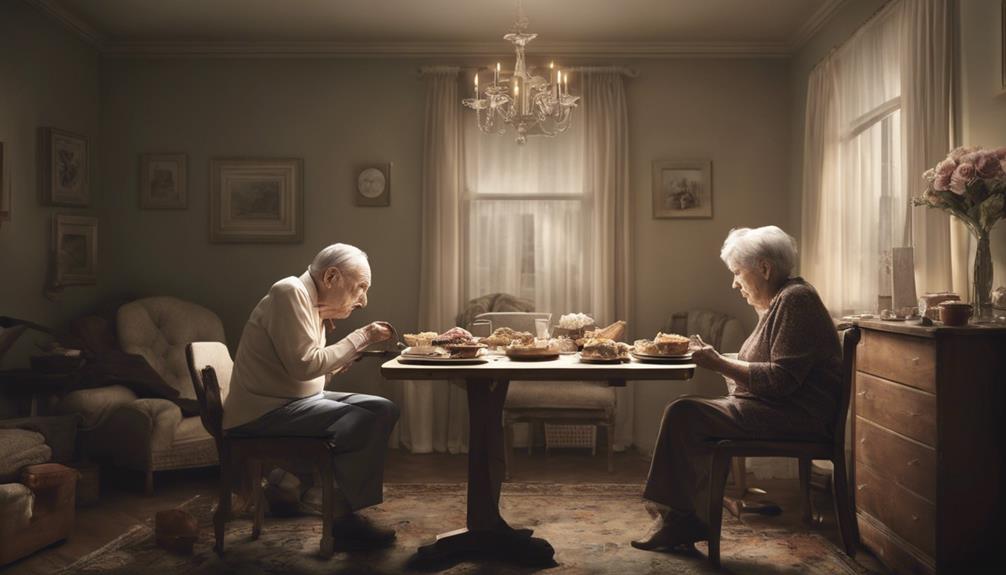A recent study has uncovered the primary factor driving behavioral changes in people with dementia, and it may come as a surprise.
Understanding this critical factor could revolutionize the way caregivers and healthcare providers approach dementia care.
By addressing this primary trigger effectively, a significant improvement in managing behavioral symptoms and enhancing the well-being of dementia patients can be achieved.
This revelation opens up a new realm of possibilities in dementia care that could reshape the current practices and elevate the standards of support provided to those affected by this condition.
Key Takeaways
- Environmental changes are the primary trigger for dementia behavior.
- Recognition and management of these triggers improve patient outcomes.
- Creating calming environments reduces challenging behaviors effectively.
- Tailored strategies and education enhance quality of life for patients and caregivers.
Groundbreaking Study Identifies Primary Trigger
The groundbreaking study unequivocally identifies changes in the environment as the primary trigger for dementia behavior. Environmental changes play a pivotal role in influencing the behavioral responses of dementia patients. Understanding how these triggers impact individuals with dementia is essential in managing challenging behaviors effectively. By recognizing and managing environmental triggers, caregivers can create a more supportive and calming environment for dementia patients.
Implementing calming strategies and fostering a supportive environment are key components in addressing the primary trigger of dementia behavior. These strategies can help reduce the occurrence of challenging behaviors and improve the overall well-being of individuals with dementia. By creating a conducive environment that minimizes stressors and disturbances, caregivers can significantly impact the behavioral outcomes in dementia patients. It’s crucial to be proactive in managing triggers and implementing supportive measures to enhance the quality of care provided to individuals with dementia.
Impact on Dementia Care Approach

Understanding the impact of environmental triggers on dementia behavior revolutionizes the approach to dementia care, offering a strategic framework for managing challenging behaviors effectively. By recognizing and addressing the primary trigger for dementia behavior, caregivers and healthcare professionals can significantly improve the quality of life for individuals with dementia. Implementing tailored strategies to manage this trigger can lead to a more supportive and calming care environment. Educating caregivers and healthcare professionals about the profound influence of this trigger on behavior is crucial for enhancing dementia care and behavior management outcomes. The following table illustrates the key points related to the impact of triggers on dementia care approach:
| Impact on Dementia Care Approach | |
|---|---|
| Recognition of primary trigger | Improved management of challenging behaviors |
| Tailored strategies implementation | Enhanced quality of life for patients and caregivers |
| Education of caregivers/professionals | Better outcomes in dementia care and behavior management |
| Supportive and calming environment | Effective management and support for individuals with dementia |
Implications for Healthcare Professionals
Recognizing the critical role of healthcare professionals in managing dementia behaviors is essential for optimizing patient care outcomes. Healthcare professionals must understand that environmental triggers are the primary instigator of dementia behaviors.
By creating a calming environment, you can effectively reduce behavior issues in dementia patients. Addressing environmental factors not only impacts the well-being of patients but also influences their behavior positively.
It’s crucial for healthcare professionals to focus on modifying surroundings to minimize triggers and ultimately enhance patient outcomes. Your attention to detail in creating a soothing atmosphere can significantly improve the quality of life for dementia patients under your care.
Enhancing Quality of Life for Patients

Paying attention to individualized care plans is crucial for enhancing the quality of life for dementia patients. Implementing personalized care plans tailored to each patient’s specific needs and preferences is essential for promoting their well-being. Engaging patients in meaningful activities that align with their interests can significantly improve their mood and overall quality of life.
Providing a safe environment with familiar surroundings can help reduce feelings of anxiety and agitation, contributing to a sense of security for dementia patients. Encouraging social interactions and maintaining regular routines are vital aspects that can foster a sense of connection and stability for individuals living with dementia.
Addressing the individual needs of patients not only promotes their dignity but also nurtures a sense of independence, empowering them to navigate their daily lives with confidence. By prioritizing these elements in care strategies, healthcare professionals can positively impact the lives of dementia patients and enhance their overall quality of life.
Global Significance and Future Research
Research has shown that environmental triggers stand out as the primary instigator of challenging behaviors in individuals with dementia. Environmental factors play a crucial role in influencing the well-being of dementia patients. Understanding and effectively managing these triggers can significantly enhance the quality of life for both patients and caregivers.
Future research may focus on developing targeted interventions to specifically address these environmental triggers in dementia care. By creating dementia-friendly environments, tailored to the unique needs of individuals with dementia, the overall care and support provided can be greatly improved.
This global significance underscores the importance of recognizing the impact of environmental factors on challenging behaviors in dementia patients. Continued research in this area is essential for advancing our understanding and implementing effective strategies to create supportive and enriching environments for those living with dementia.
Frequently Asked Questions
What Is the Number One Trigger for Dementia Behavior?
Environmental changes and disruptions serve as the number one trigger for dementia behavior. These sudden alterations can induce confusion and distress in patients. Maintaining a familiar and structured environment is vital to prevent such triggers.
Changes in routine or surroundings may lead to agitation and challenging behaviors in those with dementia. Establishing a calming and consistent environment can significantly reduce the risk of behavioral issues in dementia patients.
What Is the Number 1 Cause of Dementia?
The number one cause of dementia is neurodegenerative diseases like Alzheimer’s. These conditions lead to cognitive decline, memory loss, and behavioral changes. As the brain cells degenerate, communication between neurons is disrupted, affecting thinking, behavior, and emotions.
Understanding these diseases’ progression is crucial for early detection and intervention. By focusing on research, prevention, and treatment, we aim to improve the quality of life for those affected by dementia.
What Triggers a Person With Dementia?
When you care for a person with dementia, be mindful of triggers like environmental changes, physical discomfort, fatigue, medication side effects, and emotional stress. These factors can lead to challenging behaviors in individuals with dementia.
Understanding and addressing these triggers can help manage and improve the well-being of those you’re caring for. Stay attuned to their needs and surroundings to provide the best possible support.
Which of the Following May Trigger a Dementia Related Behavior?
Environmental changes, physical discomfort, fatigue, medication side effects, and emotional stress can trigger dementia-related behaviors. Agitation may arise from pain, communication difficulties, feeling overwhelmed, lack of routine, and environmental factors. Identifying triggers is crucial for effective behavior management.
Creating a calming environment, establishing routine, and clear communication are key strategies. Monitoring medication effects and seeking professional help when needed play vital roles in addressing dementia behavior triggers.
Conclusion
In conclusion, the groundbreaking study has unequivocally identified pain or discomfort as the primary trigger for dementia-related behaviors. This revelation necessitates a shift in the approach to dementia care, emphasizing the importance of addressing physical well-being to enhance the quality of life for patients.
As the adage goes, ‘Prevention is better than cure,’ healthcare professionals must prioritize identifying and managing triggers to create a supportive environment for individuals living with dementia.









